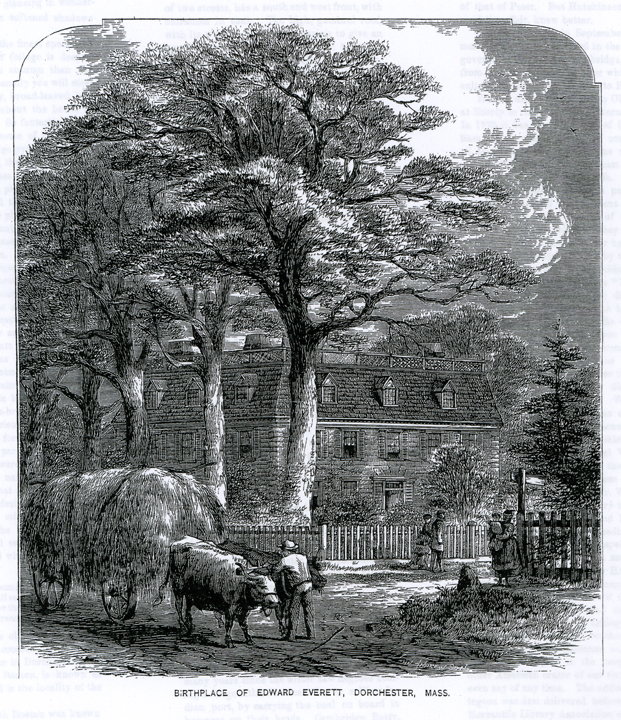
Edward Everett Birthplace
Dorchester Illustration 2651
Today’s image is an engraving from 1873 of the Edward Everett birthplace at the Five Corners, now known as Edward Everett Square. The house was taken down in 1898 for the widening of Columbia Road. The site is now occupied by an oddly-shaped three-decker and a Dunkin Donuts store as you can see here
Edward Everett went on to become governor of Massachusetts and U.S. Secretary of State among other accomplishments. The origin and early history of the house are described in Appleton’s Journal, May 31, 1873.
“It is supposed that Colonel Robert Oliver built this house about 1740, and that his son, Thomas Oliver, the last Lieutenant-Governor of Massachusetts under the crown, was either born here or on the estate, which reckoned in his time some forty acres of pasture and marsh. Dorchester might, appropriately, be called the home of governors, she having furnished Stoughton, Tailer, Belcher, Hutchinson, Oliver, Everett, and Gardner to colony or State.
“The son, afterward lieutenant-governor, had a fortune much exceeding that of his father, left him by a grandfather and great-uncle, so that Oliver, pere, did not feel called upon to make any provision for him in his will, beyond the usual mourning-suit and ring. The younger Oliver removed to Cambridge before the Revolution, where he lived in the elegant seat now known as Elmwood—the residence of James Russell Lowell [the Longfellow House]. … One fine morning in September, 1774, the men of Middlesex appeared in the lieutenant-governor’s grounds, at Cambridge, and wrung from him a resignation, after which he consulted his safety by a flight into Boston. …
“In 1775 [the Dorchester house] was the residence of Colonel William Burch, one of the royal commissioners of customs. This position was no sinecure, considering that the revenue must be collected at the hazard of the officer’s life. Burch, too, fled, and the house was taken possession of by a detachment of the regiment stationed in Dorchester in 1775. Marks of the occupation are still visible here, as they are, also, in the old Clapp homestead nearby, where the three-cornered orifices made by the soldiers’ bayonets are yet seen in the ceiling.”
Oliver Everett, Edward’s father, purchased the estate after the new government confiscated the property as having been owned by a Loyalist who abandoned his possessions by emigrating to England.
